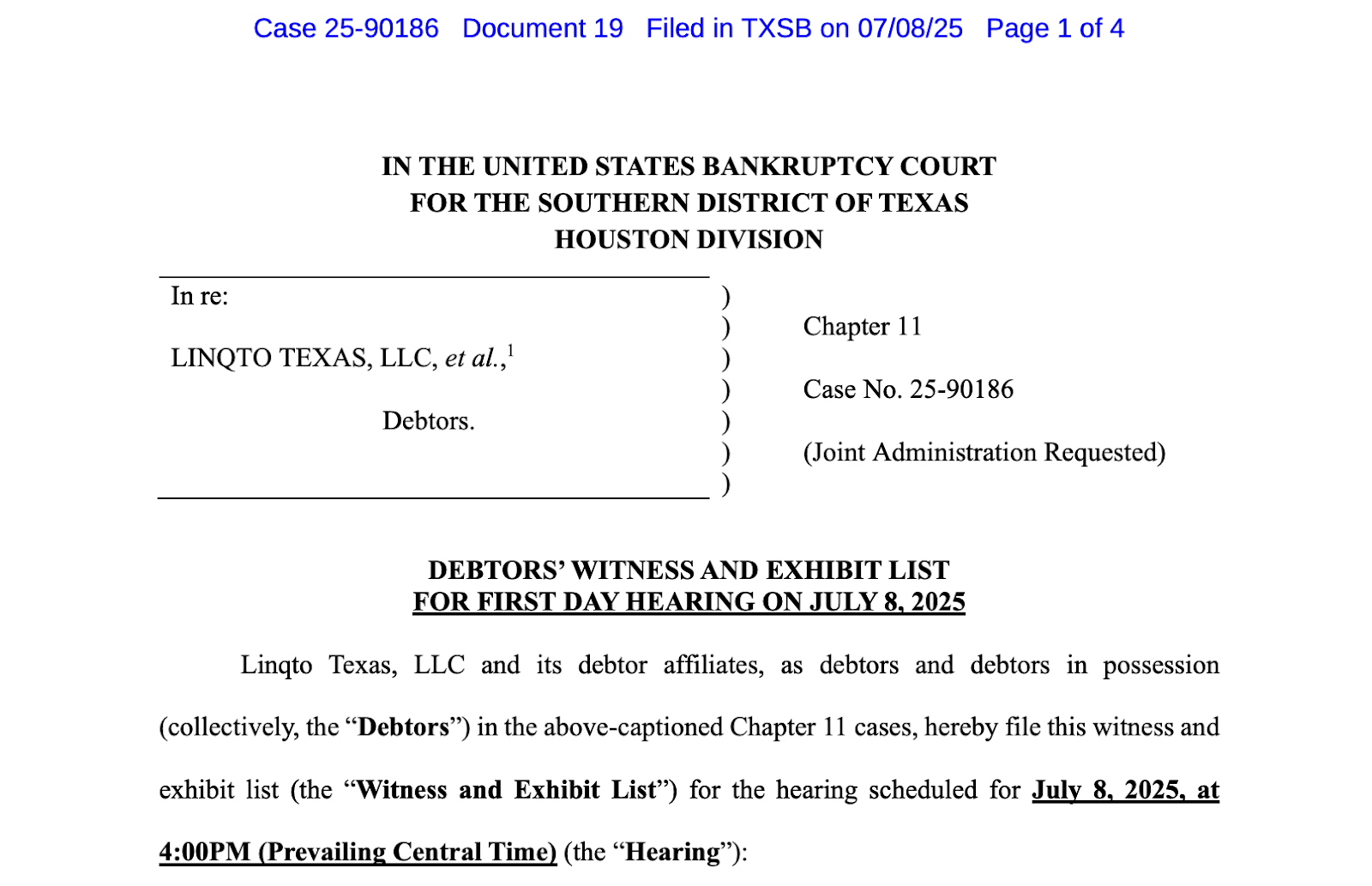“You Never Owned the Shares”: Linqto Bankruptcy Exposes Pre-IPO Illusion
Linqto, a once-prominent private investment platform promising everyday investors access to pre-IPO tech giants, has filed for Chapter 11 bankruptcy, and with it, a disturbing revelation: customers may never have truly owned the shares they believed they were buying.

Source: Epiq
The San Jose-based fintech firm submitted its bankruptcy filing in the Southern District of Texas on Monday, listing both assets and liabilities estimated between $500 million and $1 billion. The company also disclosed that more than 10,000 creditors could be affected.
At the heart of the fallout is Linqto’s widely marketed access to private shares in high-profile firms like Ripple and CoreWeave.
But the court filing on Tuesday paints a grimmer picture, alleging that “years of mismanagement” have left the company possibly insolvent and that prior executives “knowingly failed to cure extensive and serious securities law violations that began as early as 2020,” according to Chief Restructuring Officer Jeffrey Stein.
SEC Investigates Linqto Over Misleading Retail Sales of Ripple ‘Units’
Among Linqto’s most popular offerings were secondary market shares in Ripple Labs. The company claims to hold 4.7 million Ripple shares through its investment vehicle, Linqto Liquidshares, a position that could be worth roughly $450 million at current secondary prices. But questions about actual ownership have sparked alarm.
Notably, the Tuesday bankruptcy filing revealed that Linqto structured its offerings through series limited liability companies, a setup that lacked necessary transfer permissions from issuers like Ripple.
Furthermore, Ripple CEO Brad Garlinghouse took to X last week to distance the crypto firm from Linqto, clarifying that while Linqto owns the shares, it has never had a business relationship with Ripple.
“Apart from Linqto being a shareholder, Ripple has never had a business relationship with Linqto, nor have they participated in our financing rounds,” Garlinghouse wrote. He added that Ripple ceased approving Linqto purchases in late 2024 as concerns mounted.
With the confusion steering investors’ curiosity, the U.S. Securities and Exchange Commission started an investigation into whether Linqto allowed ineligible investors to purchase securities and whether its former leadership misled customers into thinking they owned actual shares, rather than indirect “representative units” with unclear legal standing.
The illusion of ownership is at the center of the controversy. According to an internal investigation initiated by new CEO Dan Siciliano, Linqto’s previous management marketed investments in a way that may have misrepresented what customers were actually buying.
“Much of what we discovered about the prior business practices at Linqto is disturbing,” Siciliano reportedly told staff. “These practices aren’t small one-off compliance or common regulatory missteps.”
Linqto Collapse Shakes Faith in Retail Access to Private Equity
Linqto’s downfall was first hinted at on June 30 when The Wall Street Journal reported the company faced federal probes and a possible bankruptcy.
The outlet cited internal memos suggesting that customers never owned the securities they believed they had purchased.
Further scrutiny fell on the company’s former leadership. Former CEO William Sarris allegedly tried to offer Ripple shares to Linqto’s 11,000 users at a markup exceeding 60%, violating SEC rules that limit such increases to 10%.
Though Sarris resigned, he still sits on the company’s board. Former Chief Revenue Officer Gene Zawrotny had already left the company and later filed a lawsuit alleging serious compliance failures and retaliation.
Now, under bankruptcy protection, Linqto is attempting to restructure. It has appointed restructuring expert Jeffrey Stein to lead the turnaround and retained several firms, including Triple P TRS, LLC, and Epiq Corporate Restructuring, for legal and administrative support.
The company aims to negotiate with the SEC and other regulators to settle outstanding liabilities and litigations in a way that “treats everyone equitably and fairly,” according to Stein’s statement.
Still, the broader damage is already rippling through the alternative investment sector. Linqto’s promise, democratizing access to the private market, appealed to thousands of retail investors eager to get in early on unicorn startups.
But the platform shuttered on March 13, cutting off all revenue streams. Now, many of those investors are grappling with the realization that the shares they thought they owned may have been little more than a promise, one that has vanished into bankruptcy court.
As Garlinghouse emphasized, “I have no idea how Linqto managed the participants to whom they sold ‘representative units’ of Ripple shares… I can’t provide any reassurance about Linqto’s business practices or how they will handle it now.”
He added, however, that the underlying value of Ripple shares has increased and “there should be considerable gains on those shares for ‘Linqto unitholders.’”
Whether those unitholders ever see those gains or any restitution at all now depends on what unfolds in bankruptcy court.
Linqto’s first hearing is scheduled for Tuesday, where the scope of the damage and the prospects for recovery may finally begin to take shape.
You May Also Like

Nasdaq-listed GameSquare Secures $8M to Initiate $100M ETH Treasury

OpenSea acquires Rally Wallet to expand mobile and token trading capabilities
